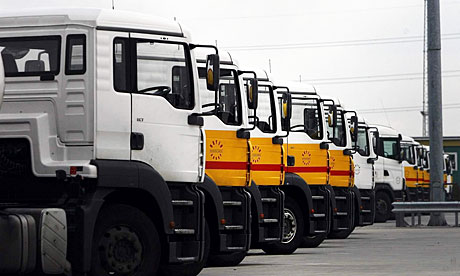
The threat of a national fuel strike has been averted after petrol-tanker drivers voted to accept a deal.
The Unite trade union said 51% of drivers had backed the proposals in a ballot, despite a recommendation to reject the deal, ending a dispute that caused a petrol panic when it erupted in March.
The peace document, thrashed out after eight days of talks at the Acas conciliation service, introduces common standards for safety and training as well as an accreditation scheme for drivers.
Unite and senior shop stewards had urged more than 2,000 drivers to reject the document, but the majority of members went against the recommendation. A union source said the drawn-out nature of the dispute appeared to have weakened the drivers' appetite to hold out for the rest of their demands, which had included a floor on pay and an agreement on transferring pensions. Fuel distributors had also warned that they had gone as far as they could in peace talks.
Diana Holland, assistant general secretary of Unite, said the union wanted rapid implementation of the proposals and warned distributors against complacency after 49% of those balloted said no to the deal. "This narrow vote in favour lifts the threat of strike action, but leaves the companies with no room for complacency. We look forward to the rapid implementation of the Acas proposals which include an industry-wide 'passport'."
Ed Davey, the energy and climate change secretary, said about 1,400 military drivers had been trained to replace petrol tanker employees if strikes had been called. "A strike would have been disruptive to the hardworking lives of millions of motorists around the country and put unnecessary pressures on our essential and emergency services.
"The government was prepared, however, and I want to pay tribute to the military who have been training over the last few weeks." The AA said the result was a "welcome relief" for drivers and families.
The vote to accept the deal came despite visits by a roadshow staffed by Unite officials and shop stewards to drivers at five petrol refineries across the UK.
The ballot covered drivers at seven fuel distributors who deliver petrol for clients including Shell, Esso and Tesco.
Employees at five of those companies voted for strike action in March in a dispute over the consequences of outsourcing, which has seen major oil groups and supermarkets contract out petrol deliveries to third parties. As a result, Unite said, standards on safety and pay have come under constant pressure as delivery contracts changed hands every three to five years.
However, even a no vote against the peace deal would not have resulted in full-blown national strikes after drivers at the largest distributor, Hoyer, voted against strikes in a re-staged ballot this week.
Maria Eagle, the shadow transport secretary, called on prime minister David Cameron to apologise for the ministerial comments in March that contributed to an outbreak of panic buying at petrol stations. Francis Maude, the cabinet secretary, was criticised by the Fire Brigades Union for or suggesting that motorists should keep a back-up petrol supply "in a jerry can in the garage". A 46-year old mother of two subsequently suffered severe burns after her clothes caught fire while decanting petrol in her kitchen.
Eagle said: "Throughout this process, Labour has been clear of the need for the government to work with both sides to secure a resolution. The decision by David Cameron and his ministers to play politics with such an important issue has been completely irresponsible."

